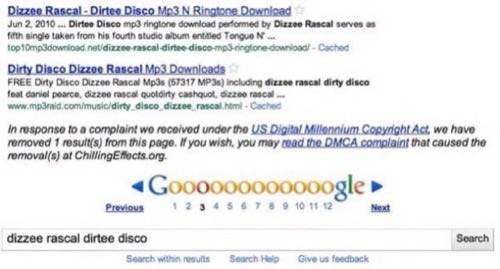The music and movie industries have been on a quest to place blame ever since they realized they were losing sales to Internet piracy. The RIAA in the United States went as far as to sue and fine individual users for downloading songs on peer-to-peer services like Napster and Limewire, or websites like The Pirate Bay or SendSpace. Others went after the services themselves, and in most cases were successful, though many others still exist. Now, BPI (British Recorded Music Industry), the U.K.’s version of the RIAA, is going after the middle man, Google, by serving the search giant with a DMCA take-down notice.

“We have identified the following links that are available via Google’s search engine, and request the following links be removed as soon as possible as they directly link to sound recordings owned by our members.”
– BPI’s DMCA Notice
Essentially, BPI is serving Google because it provides links to sites like MegaUpload, Zippyshare and Hotfile – all places where copyrighted content can allegedly be downloaded for free. A quote from
courtesy of the site
spells out BPI’s complaint.
“Part of our work involves monitoring the internet and taking action against persons that use, facilitate, enable and/or authorise the use of material in a manner that infringes the rights of the members of BPI and [Phonographic Performance Limited]. We have identified the following links that are available via Google’s search engine, and request the following links be removed as soon as possible as they directly link to sound recordings owned by our members,” the notice says.
The BPI identified 38 links to 17 songs that they found from Google links to various file sharing services, including works from Christina Aguilera, Lady Gaga, Michael Bublee, Usher, Ke$ha and the cast of Glee to name a few. They even went as far as to identify the 38 various search terms that could lead one to find these files, including phrases like “lady gaga alejandro zippyshare,” and “the pretty reckless make me wanna die free download.”

Google has been quick to remove copyrighted material from services like YouTube where it hosts the content, but it has not been so quick to remove infringing sites entirely from its search index. Google has, however, removed the 38 requested links at the behest of BPI, but many other file sharing site links remain among the results. In the image above, the third page of results for “dizzee rascal dirtee disco” shows Google’s notice that the requested results have been removed. This, of course, is displayed directly below results where the song can be found at other sites.
In section 4 of the DMCA notice, BPI lists 9 different sites that contain these copyrighted files. BPI should have sent 9 different DMCA notices to these sites, not to Google. For better or for worse, Google has become a launch pad from which many people surf the Web. We learned this the hard (and amusing) way earlier this year when a story of ours displaced the typical top result for “Facebook login” on Google, sending wayward Web surfers to our article.
When Googling something is the equivalent of entering the URL in an address bar for many people, you can’t place the blame for illegal content on Google. If BPI wants to sue someone over illegal access to music, it should be the sites providing that service, not those simply linking to it.









